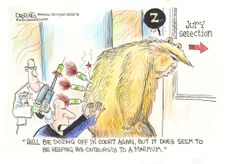The Republicans' Ukraine conspiracy theory is going mainstream
Democrats need to dismantle it before it's too late


Republicans are getting to the rock-bottom of it.
They have defended President Trump throughout the public impeachment hearings by arguing his gangster efforts to force a Ukrainian investigation into its (imagined) interference in the 2016 election were actually completely legitimate. Rep. Devin Nunes (R-Calif.) has made this point repeatedly, assailing Democrats for their alleged collaboration with Ukrainian election interference efforts and asking, as he did during former Ambassador to Ukraine Marie Yovanovitch's testimony, "what is the full extent of Ukraine's election meddling against the Trump campaign?"
If you're unfamiliar with the paranoid depths of the right-wing media universe, this kind of talk probably puzzled you. But make no mistake: The Ukraine fantasies peddled by House Republicans are nothing less than a concerted attempt to do what the GOP has done with all of Trump's misconduct since the beginning of his presidency — to use a combination of denial and redirection to foment skepticism and doubt about the underlying charges.
Subscribe to The Week
Escape your echo chamber. Get the facts behind the news, plus analysis from multiple perspectives.

Sign up for The Week's Free Newsletters
From our morning news briefing to a weekly Good News Newsletter, get the best of The Week delivered directly to your inbox.
From our morning news briefing to a weekly Good News Newsletter, get the best of The Week delivered directly to your inbox.
In this case, the Ukraine meddling red herring is used to justify Trump's obstructive acts and his attempts to extort the Ukrainian government into opening an investigation in exchange for military aid and a White House visit. And if Democrats don't begin a major effort to dismantle this nonsense in public, they may very well lose the battle for public opinion in the same way they allowed themselves to get outfoxed with the Mueller probe.
When referencing the Ukraine ideas, Democrats have called them "discredited" and "debunked" over and over again, which of course they are. But referring to them as such does nothing to prove it to voters who don't read Vox explainers and Washington Post investigative reports. To the kind of "pox on both houses" voters whose mood swings might determine the outcome of the 2020 election, all they hear is people from two parties they hate yelling at one another and accusing each other of the exact same things.
One important reason Democrats must be better prepared to fend off Ukraine-related conspiracy mongering is that Attorney General Barr is preparing some kind of ginned-up report that will line up neatly with Republican efforts in the hearings to pin 2016 election interference on Ukraine. It will suck all of the oxygen out of the proceedings for days or even weeks. Earlier this year, Barr tasked U.S. Attorney John Durham with investigating the origins of the various Trump-Russia investigations in 2016, which culminated in the appointment of Special Counsel Robert Mueller in 2017. The Department of Justice recently revealed, ominously, that this was now a criminal probe. Barr himself has been jet-setting around the world looking for confirmatory evidence.
What's it all about? There are two Ukraine-related conspiracy theories, which are likely to converge in the coming weeks as GOP efforts to save Trump accelerate. The first involves the infamous Russian hacking of the DNC in the spring of 2016, which led to months of leaked emails disseminated via Wikileaks, whose release was often timed to inflict maximum damage on the Clinton campaign. In his July 25 phone call with Ukrainian President Volodymr Zelensky, Trump asked him about "Crowdstrike" and the "server." This references a truly insane, far-right fantasy that in fact it was Ukraine, in collaboration with the Clinton campaign, that hacked the DNC and then blamed it on Russia to make the Trump campaign look guilty.
In this make-believe world, Crowdstrike cofounder Dmitri Alperovitch is a Ukrainian (he is actually an American citizen who serves as a fellow on the august Atlantic Council) who absconded back to his country with the server, and the FBI had to take their word for it that Russia was culpable. Back on Earth-1, on the other hand, Crowdstrike provided the FBI with all of its forensic data, no serious person disputes that Russia was responsible for the hacking, and there is no single "server" which can be physically transported to Kiev.
The Crowdstrike lunacy has not yet been affirmatively advanced by Republicans in these hearings, although no one should be surprised if it is. But the idea that Ukraine was responsible for triggering the FBI's counterintelligence probe into the Trump campaign has now gone mainstream.
The story goes like this: Corrupt Ukrainians fabricated a "black ledger" implicating former Trump campaign director Paul Manafort in various forms of corruption when he was a key advisor to former Ukrainian president Viktor Yanukovych, a pro-Russian stooge, so that the Trump campaign's May 2016 hiring of Manafort as campaign manager would look especially suspicious. In this telling, the incident in which Trump campaign staffer George Papadopoulos bragged to an Australian diplomat about how Russia had stolen dirt on Clinton was actually a CIA set-up.
The conspiracy theory then alleges that at the same time, Ukrainian embassy officials were working with a consultant named Alexandra Chalupa (who held a minor post with the DNC) to channel incriminating information about Trump and Manafort to reporters and intelligence agencies. CIA Director John Brennan then supposedly manipulated this information and baited the FBI into opening its investigation. (This is why House Republicans put Chalupa on a list of witnesses they wanted to testify.) The Clinton campaign, meanwhile, was using a firm called Fusion GPS, which paid former British spy Christopher Steele to produce a lurid dossier about Trump. (Though of course it wasn't released and was only made public by Buzzfeed after the election.) The FBI, supposedly at Brennan's behest, then improperly used information gleaned from Ukrainians via Chalupa and Steele to trigger its counterintelligence investigation into the Trump campaign. (There's more, of course, but this is an article, not a book.)
To simplify for those who are still with me: Corrupt U.S. intelligence officials glommed onto false allegations pushed at them by Ukrainians terrified of a Trump administration and used them to launch years of phony investigations against both candidate and President Trump. The Mueller report, so this story goes, proved that this was all a hoax from the get-go, and now President Trump and Attorney General Barr just want to get to the truth about what really happened.
It should almost go without saying that this is all nonsense, the product of shut-ins decorating large poster boards with paranoid speculation and unsubstantiated rumors and then laundering it all through various luminaries in the right-wing media cocoon. None of it makes any real sense.
To have worked, it had to have involved former CIA director John Brennan, FBI Director James Comey, and Attorney General Loretta Lynch. The number of conspirators must have run into the hundreds, many of whom would have been career public servants (as opposed to political appointees) in the intelligence agencies and the FBI. Yet none of them are talking?
Second, if the FBI was part of a plot to destroy then-candidate Trump, why did FBI Director James Comey then go out of his way to assail Clinton as "extremely careless" in his June 5, 2016, press conference and then theatrically announce that he was looking at new emails just days before the presidential election, a maneuver that may have led directly to her loss?
Third, why would the Clinton campaign have conspired with Ukraine against itself to release a long series of damaging or distracting emails from people like John Podesta?
Lastly, in the closing days of the campaign, when the polls had tightened and there was a very real possibility of Trump winning the election, why didn't any of the conspirators do more to release this information to the media? Why would the conspirators bury their own conspiracy?
The problem for Democrats is that these questions don't immediately come to mind for most people. Americans, most of whom who have not read the 448-page Mueller Report and are only dimly aware of the many troubling details about the Trump campaign's efforts to work with Russian hackers to subvert the 2016 election, watched Democrats simply walk away and turn off the lights after Mueller's July 24 testimony before Congress, seemingly resigned to the president's triumphant efforts to obstruct justice. Now Democrats have to contend with this Republican counternarrative, which if not pushed back on aggressively, will appear just as credible to the modestly informed.
It might sound equally bonkers, but Democrats should think about tackling it all head-on, perhaps by calling in a leading Ukraine conspiracy advocate like Sean Hannity to testify before Congress, followed by witnesses like Brennan who can then dismantle it all piece by piece. There is no way that Hannity or anyone else would be able to hold it together through hours of interrogation by Daniel Goldman, who capably led some of the questioning for House Democrats in last week's hearings. Give Republicans their wish and bring in Chalupa, who is desperate to testify. Bring in Alperovitch. If they really want to stop the news cycle and force everyone to watch, bring in former President Obama himself. Take a week, and blow the whole kooky theory to pieces.
Remember: This is all one story. The Trump-Giuliani Ukraine caper was partly about screwing with the 2020 election, but it was also about fabricating evidence to support the administration's nutso counter-narrative that the real villains in 2016 weren't the Russians but rather Ukrainians and Obama administration officials from the "deep state" working together to smear Our Great President. The behavior that led to these impeachment hearings is part of a maximalist plot to completely exonerate both Russia and the president of any wrongdoing, all driven by Trump's thin-skinned obsession with legitimacy, and his administration's barely-concealed hunger to engage in further abuses of power.
If they get away with this, they can get away with anything, and they know it. That's why Democrats need to take the time to get this story right, and convince the public that there is nothing to the GOP's Ukraine fever dreams but sweaty sheets and bad faith.
Want more essential commentary and analysis like this delivered straight to your inbox? Sign up for The Week's "Today's best articles" newsletter here.
Create an account with the same email registered to your subscription to unlock access.
Sign up for Today's Best Articles in your inbox
A free daily email with the biggest news stories of the day – and the best features from TheWeek.com
David Faris is an associate professor of political science at Roosevelt University and the author of It's Time to Fight Dirty: How Democrats Can Build a Lasting Majority in American Politics. He is a frequent contributor to Informed Comment, and his work has appeared in the Chicago Sun-Times, The Christian Science Monitor, and Indy Week.
-
 5 sleeper hit cartoons about Trump's struggles to stay awake in court
5 sleeper hit cartoons about Trump's struggles to stay awake in courtCartoons Artists take on courtroom tranquility, war on wokeness, and more
By The Week US Published
-
 The true story of Feud: Capote vs. The Swans
The true story of Feud: Capote vs. The SwansIn depth The writer's fall from grace with his high-flying socialite friends in 1960s Manhattan is captured in a new Disney+ series
By Adrienne Wyper, The Week UK Published
-
 Scottie Scheffler: victory for the 'pre-eminent golfer of this era'
Scottie Scheffler: victory for the 'pre-eminent golfer of this era'Why Everyone's Talking About Masters victory is Scheffler's second in three years
By The Week Staff Published
-
 Arizona court reinstates 1864 abortion ban
Arizona court reinstates 1864 abortion banSpeed Read The law makes all abortions illegal in the state except to save the mother's life
By Rafi Schwartz, The Week US Published
-
 Trump, billions richer, is selling Bibles
Trump, billions richer, is selling BiblesSpeed Read The former president is hawking a $60 "God Bless the USA Bible"
By Peter Weber, The Week US Published
-
 The debate about Biden's age and mental fitness
The debate about Biden's age and mental fitnessIn Depth Some critics argue Biden is too old to run again. Does the argument have merit?
By Grayson Quay Published
-
 How would a second Trump presidency affect Britain?
How would a second Trump presidency affect Britain?Today's Big Question Re-election of Republican frontrunner could threaten UK security, warns former head of secret service
By Harriet Marsden, The Week UK Published
-
 'Rwanda plan is less a deterrent and more a bluff'
'Rwanda plan is less a deterrent and more a bluff'Instant Opinion Opinion, comment and editorials of the day
By The Week UK Published
-
 Henry Kissinger dies aged 100: a complicated legacy?
Henry Kissinger dies aged 100: a complicated legacy?Talking Point Top US diplomat and Nobel Peace Prize winner remembered as both foreign policy genius and war criminal
By Harriet Marsden, The Week UK Last updated
-
 Trump’s rhetoric: a shift to 'straight-up Nazi talk'
Trump’s rhetoric: a shift to 'straight-up Nazi talk'Why everyone's talking about Would-be president's sinister language is backed by an incendiary policy agenda, say commentators
By The Week UK Published
-
 More covfefe: is the world ready for a second Donald Trump presidency?
More covfefe: is the world ready for a second Donald Trump presidency?Today's Big Question Republican's re-election would be a 'nightmare' scenario for Europe, Ukraine and the West
By Sorcha Bradley, The Week UK Published